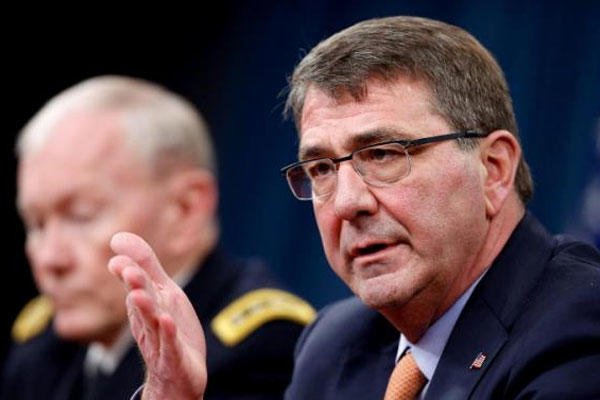Defense Secretary Ashton Carter acknowledged Thursday that a resurgent ISIS was threatening to take the capital of Anbar province in Iraq while another Al Qaeda offshoot was making advances in Yemen.
Carter, joined at his first Pentagon news conference by Joint Chiefs Chairman Gen. Martin Dempsey, confirmed that Al Qaeda in the Arabian Peninsula (AQAP) in Yemen had seized the Riyan Airport, a nearby military base and the Dhabah oil terminal on the Arabian Sea.
The defense secretary said that AQAP was taking advantage of "an opportunity in the environment created by the turmoil in Yemen," where Houthi rebels backed by Iran have come under air attack by Saudi Arabia supported by the U.S.
Carter said AQAP was of particular concern because of its declared intention to launch terror attacks on the U.S. homeland.
"We continue to watch them and take action against AQAP," he said without giving specifics.
Both Dempsey and Carter noted that U.S. Army Gen. Lloyd Austin, head of the U.S. Central Command, met in Riyadh Thursday with the Saudi leadership.
The U.S. has set up a "fusion center" in Saudi Arabia to provide intelligence and logistics support to the Saudi air campaign. The U.S. earlier this month began providing daily tanker flights to refuel Saudi warplanes if needed.
"We have undertaken to help them protect themselves," Carter said of the Saudis, but the ultimate goal was a political settlement in Yemen.
On Iraq, Dempsey said that the ISIS push against Ramadi, a city of about 300,000 70 miles west of Baghdad, had already forced much of the population to flee.
"It's already a humanitarian problem," Dempsey said. "It's not about bricks or mortar, it's about defeating ISIL," another acronym for the Islamic State of Iraq and Syria (ISIS).
Dempsey said he was more concerned about a separate ISIS push to the north against the oil refinery city of Baiji.
"Baiji's a little different. Baiji's a more strategic target. That's why the focus now is on Baiji. We're focusing a lot of ISR (Intelligence Reconnaissance Surveillance) and air in there," Dempsey said.
Carter and Dempsey said they had discussed countering ISIS moves in Ramadi and Baiji in meetings this week with visiting Iraqi Prime Minister Haider al-Abadi. Dempsey said indications were that Abadi would focus on clearing Anbar province of ISIS and secondarily on progressing north toward Mosul.
Carter said he stressed to Abadi that Shiite militias involved in the fight against ISIS come under the control of the Iraqi government and not be directed by Iran. Currently, some of the Shiite militias answer to the Iraq government and "there are those that don't," Carter said.
Abadi must make clear that militias controlled by Iran "are not welcome there and certainly will not be supported by us," Carter said.
Carter and Dempsey also said that U.S. military options would be "intact" should proposed nuclear agreements with Iran fail despite Russia's announcement earlier this week that it would sell S-300 missile defense systems to Iran.
"We have known about the potential for that system to be sold to Iran for several years and have accounted for it in all of our planning," Dempsey said.
Carter began the news conference by noting that it's been nearly two months since he succeeded Chuck Hagel as Defense Secretary. In that time, Carter said he had set out three priorities – helping President Obama make the best military decisions, supporting the troops and their families, and setting an agenda for the future force.
On the future force, Carter last week unveiled a plan in a speech at Syracuse University to improve recruiting and retention by revamping promotions policy to allow applicants with high-tech skills to enter at higher rank. He also said he wanted to expand the use of sabbaticals to allow for advanced education.
-- Richard Sisk can be reached at richard.sisk@military.com




























